We began our ministry in Togo in 2009 with the Child Sponsorship Program. In just under two years we have registered more than 4,300 children and we partner with 20 Implementing Church Partners.
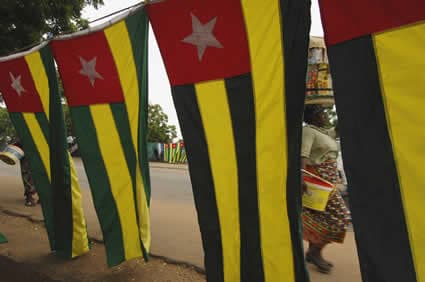
Our country office has a staff of 13 and three major departments: Ministry Services, Program Implementation and Program Communications.
Country Director
Komlavi Ataty Agbeayema (aka Peter) joined our ministry in Togo in 2009 as a Program Facilitator and then became acting Program Implementation Manager. Soon after, he was appointed Country Director.
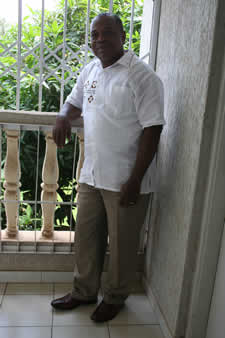
Before coming to our ministry, Peter gained a wealth of experience working with national and international non-govermental organizations such as Christian Children Fund, the National Association for the Promotion of People with Special Needs, the Special Olympics, and Lifeline International, where he served as executive director for the West Africa region.
Peter holds a masters degree in social science from the University of Dakar in Senegal.
He is one of the preachers at his local church, the International Pentecostal Church, and he and his wife help with many other church activities as well.
Implementing Church Partners
Implementing Church Partners (ICPs) are local churches in Togo with whom we work to deliver child development ministry to the field.
- Spiritual Climate
The majority of the Togo population are traditionalists and animists. Overall, there are very few Christians in Togo, but evangelical Christian churches are growing in number. As of this report, there is no known persecution of Christians in Togo. - Unique Challenges
One challenge we face is that we do not have enough staff. Staff members must take on additional responsibilities, which makes it difficult for them to focus on one particular job. - Contributions
Implementing Church Partners construct offices for child development centers and provide office furniture for the development center staff. Some ICPs provide computers for the center office, but that is rare. - Partner Development Activities
Our ministry in Togo develops partners through training and by supplying them with manuals and documents.
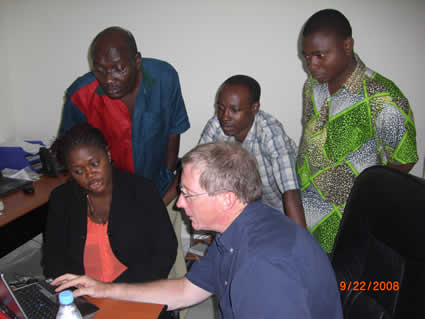
Child Development Through Sponsorship
Your sponsorship of a child in Togo provides a variety of benefits, including educational assistance, nutritional support, medical checkups and medicines (as needed), development of social and practical skills, biblical teaching, and opportunities to give his or her life to Jesus Christ.
- Meeting Times
The children are busy with school during weekdays, so they meet for eight hours each Saturday at their Compassion-assisted child development centers.
- 3 to 5 year olds: 8 hours on Saturday
- 6 to 8 year olds: 8 hours on Saturday
- 9 to 11 year olds: 8 hours on Saturday
- 12 to 14 year olds: We have not yet started
- Nutritional Support
Every child receives a meal each time he or she attends the development center. A typical meal consists of rice, chicken and fruit. We provide this food because the children are not fed at school and the food at home is often not nutritionally balanced.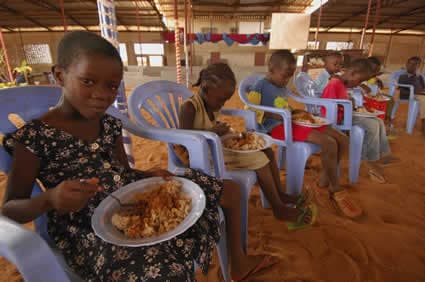
- Vaccinations
Standard vaccinations are given free of charge to the children at nearby public clinics. - Extracurricular Activities or Community Service
The children participate regularly in sports and tree planting. - Parent Involvement
Some parents help with food preparation for the children on Saturdays. - Areas of Expansion for the Child Survival Program
After we have covered the majority of the capital city, we plan to expand our ministry to the northern part of Togo.
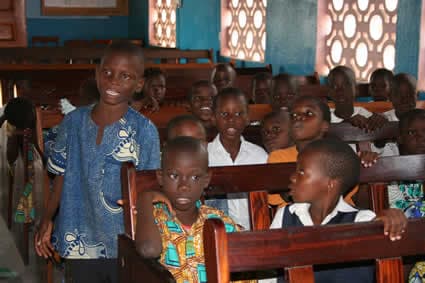
Complementary Interventions
Our core child sponsorship program, while comprehensive, does not address all obstacles to a child’s healthy development. The Complementary Interventions program was created to work with our holistic child development model to provide additional services, such as our AIDS Initiative, Bibles for all children, disaster relief and water projects.
Our ministry in Togo uses Complementary Interventions to support families during disasters and to distribute insecticide-treated mosquito nets.
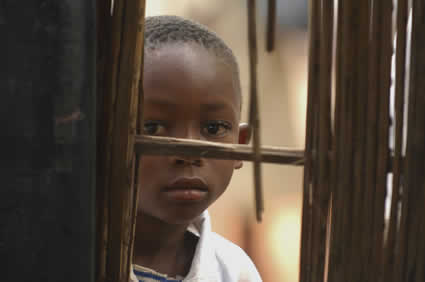
Highly Vulnerable Children
The main need among highly vulnerable children in Togo is shelter. To address this, we are planning to train parents on income-generating activities.



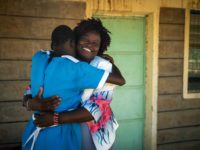




13 Comments |Add a comment
Hello: I sponsor a 12 year old boy. How is he benefiting from my sponsorship? This information says that there is no Saturday program for his age group. Does he not get a nourishing meal? How/when is he learning about God’s love for him?
Hi, Sharon. Thank you for reaching out about your child in Togo. Because this blog is from 2011, its contents may no longer be 100% accurate as centers adapt to needs based on their communities. Would you kindly send us an email to [email protected]? We would be happy to look into your child’s Compassion center, answer your questions, and see what information we can find. Thanks!
Hi Togo staff, our youth group sponsors a little boy from Togo,. his name is Blaise. One day we want to meet him. Meanwhile, is there a united Methodist church presence in Togo or anywhere close by?
I sponsor a 9 year old girl in Togo. I would not only enjoy visiting some day, but being retired and having income I’d be please to volunteer my time in Togo. I have experience in records management, have good basic handyman skills, and am a certified Phlebotomist.
God be with you all.
I just read your comment and was interested because we have worked in Togo. My husband is med tech. We have helped with labs at 2 hospitals in Togo. We’d be interested in your background, etc. Our hospitals -one in north, one in south, are affiliated with ABWE, a Baptist mission.
Could you provide me the address and the telephone of the manager in togo
Jean Baptist – Can you please e-mail us your request and we can help you from there? It is [email protected]. Thank you!
I sponsored a child (Akoko) from here!!!
Our Adjo also resides in Togo!
Thank you for this information on Togo – there is very little information available about this country, so I appreciate this look into the culture.
Are the children only receiving a nutritious meal on Saturday, since that’s the day they meet at the center? Or do they come after school for snacks/meal. Sorry, I’m confused.
Every time a child comes to the child development center they receive some form of nutrition. That can be a full meal, a snack and/or vitamins. Currently in Togo, the children receive a full meal on Saturdays when the development center is open.
That’s what it sounds like. If they stick to their schedule of only meeting on Saturdays, and only provide a meal when they meet, then the children wouldn’t come after school during the week.
Nationally it’s still a new program for them–only 2 years. I’m glad they’re working with parents on income-generating activities to provide adequate shelter. I hope that future guardian education includes education on nutrition and assistance in acquiring it–either through continued income-generating activities, or perhaps a community garden or some other method, whatever works best for them.